
Viewpoints | Jul 13,2020
Beneath the shadow of a gleaming development, the festive spirit of the holiday market dims. Displaced sheep vendors deal with dwindling sales, while a nearby cattle market thrives and a well-stocked but deserted agricultural centre struggles to attract customers, finds AKSAH ITALO, FORTUNE STAFF WRITER.
A palpable sense of dread hung over the Qera market this holiday season. The expansive fields, once alive with a mix of sheep and goats, are now eerily quiet. Piles of construction materials from nearby demolitions have replaced the four-legged residents.
The massive corridor development project which began two months ago displaced 18 sheep vendors. Nursedin Nur, his face etched with worry, surveys his meagre 150 sheep – a fraction of his usual stock. They now struggle in a less visible location. Efforts to secure a temporary space for the holidays proved futile.
"We've been exiled," Nursedin mutters, gesturing to his dwindling flock. "This is my life's work."
Delil Jemal, the team leader, describes their plight. Their pleas for a reprieve during the holidays fell on deaf ears. With the vibrant market atmosphere gone, sales have plummeted.
"No one comes here," Delil despairs. "We've lost everything."
Despite a slight price dip compared to Christmas, the future remains uncertain. Officials hint at a temporary market, but details are scarce. Nursedin and his colleagues, caught in the crossfire of progress, face an uncertain holiday season.
Delil sees no way of replacing the buzzing atmosphere of their former place of work with another marketplace.
"We have lost it all," he said.
The unbothered flocks of sheep tucked in every other corner fetch between 5,000 Br and 20,000 Br. There is a slight price dip from Christmas time, which hovered between 8,000 Br and 23,000 Br.
Although officials disclosed efforts are underway to offer temporary space a few kilometres away in the Bulgaria area for the holiday market, Tesfaye Nemera, deputy head of the wereda 5 administration, said lobbying is all they can do as clear directions have been coming from the City Administration.
"It is beyond our mandate," Tesfaye told Fortune.
While the government seems to be moderately successful by dropping the inflation rate by 2.2 percentage points to 28pc, economist Atlaw Alemu (PhD) believes long-term solutions can be achieved by permanently addressing security concerns, strategic public expenditures, and corrections to systemic economic problems—holiday or not. He said systemic incompetency and disrupted supply chains plague the wider commodity market.
"A tight monetary policy should not allow poor expenditure management," he said.
The bovine market a few meters away was faring relatively better. Its safe distance from the main road had spared the vendors from the ravages of developmental demolitions.
Bovines from Harari, Wellega and Jimma towns roam freely as their owners chase after them. The prices were also markedly higher in this part of Qera, with the horned bovines fetching between 55,000 Br and 400,000 Br. The last holiday saw prices of bovines from 80,000 Br to 200,000 Br.
Vendors such as Simeneh Belayneh eagerly await to talk up any customers who might throw a glance at his merchandise. Simeneh has halved their supply this year from 18 bovines.
"I don't want to experience last season's losses," he said.
A group of six men hops from vendor to vendor, haggling for better prices, for three hours. For the 60,000 Br budget which will be divided six ways, Nigatu Kinde, the leader, had difficulties finding a "good option for a fair price." He said prices for the cattle size his group is looking for are nearly double their budget. "These are unbelievable prices," he said, looking to try his chances at another market.
"Things sure have changed from last year," Nigatu told Fortune.
Halfway across the capital in Addisu Gebeya, chickens have been stoking much less frustration from holiday shoppers. The 56-year-old Emebet Abebe has haggled her way into a 150 Br price cut with one of the retailers to 1,100 Br.
"It is 200 Br over my budget," she said.
Emebet has faced a rough fiscal patch over the past two months as her landlord increased prices by 20pc for a condominium around Asko to 12,000 Br. She did not consider buying sheep or oxen this year, opting to keep the holiday spirits with two chickens instead.
"I might buy a kilo of meat after a week or so," she said. "It is getting tough to get by."
A contrastic narrative unfolds for vendor Mousa Bekele. He was caught in a rapturous frenzy trying to offload the 90 chickens clucking away in his stand, priced between 550 and 1,400 Br. Brimming with the confidence of someone who has sold half his inventory, he said: "Business is booming."
A new agricultural market centre built by the city administration in the Kolfe Qeranyo district presents a stark contrast. The three consumer associations selected by wereda officials to showcase their offerings are barely making any sales.
The deafening promotion blasting from the giant speakers, the fully stocked warehouses and the smiling retailers have done little to attract customers. Fresh paint glistens from the walls of the 23,000Sqm edifice, where one can hear a needle drop. Red teff priced upto 11,080 Br, onions at 55 Br a kilo, or a five-litre edible oil at 1,100 Br offered by the associations has done little to draw attention to the 90 shops.
Retailer Legesse Demisse has been fighting off sleep as hours go by without a single buyer asking for prices. A month after opening his shop following a winning bid, the retailer has lost hope in the market centre's prospects.
"I had high hopes," he said.
The Kolfe Agricultural Market Centre is one of three edifices built by the city administration at nearly seven billion Birr by Ovid Construction. It is one of the three centres strategically located at entry points into the capital, alongside the Lemi Kura and Aqaqi Qaliti areas. The 200 available shops attracted 600 offers when announced a few months ago.
For the supervisor at the site, Eresa Feyisa, "maintaining a steady supply of affordable commodities is all that matters." Eresa said up to 1,332Qtl of crops and 112Qtl of vegetables and fruits have been making their way to the market daily. He said not enough people know about the market centre yet. However, he expects the inflow of customers to increase as more people learn about the affordable prices.
Jelan Aliye partly shares the optimism. She has fully stocked on butter from Wellega priced at 50 Br lower than inner city vendors at 700 Br a kilo, cheese at 250 Br and eggs selling for eight Birr a piece.
"Once a few shoppers hear the prices, things will improve," Jelan told Fortune.
Sewnet Ayele, communication director of the Addis Abeba Trade Bureau, said they visit the market centres three times a week to ensure affordable prices at 20pc less than market value. He said the main goal of the markets is to circumvent food inflation by streamlining supply chains between farmers and consumers.
"Our goal is to make the prices affordable," Sewnet told Fortune.
Sheep vendors displaced from their familiar market place in the Qera area.
A vendor from Raey Consumers Association proudly showcasing the offerings at Kolfe Agricultural Market Centre.
Inside the market centre, vendors struggle to find cusomers.
PUBLISHED ON
May 04,2024 [ VOL
25 , NO
1253]

Viewpoints | Jul 13,2020

Fortune News | Jul 25,2020
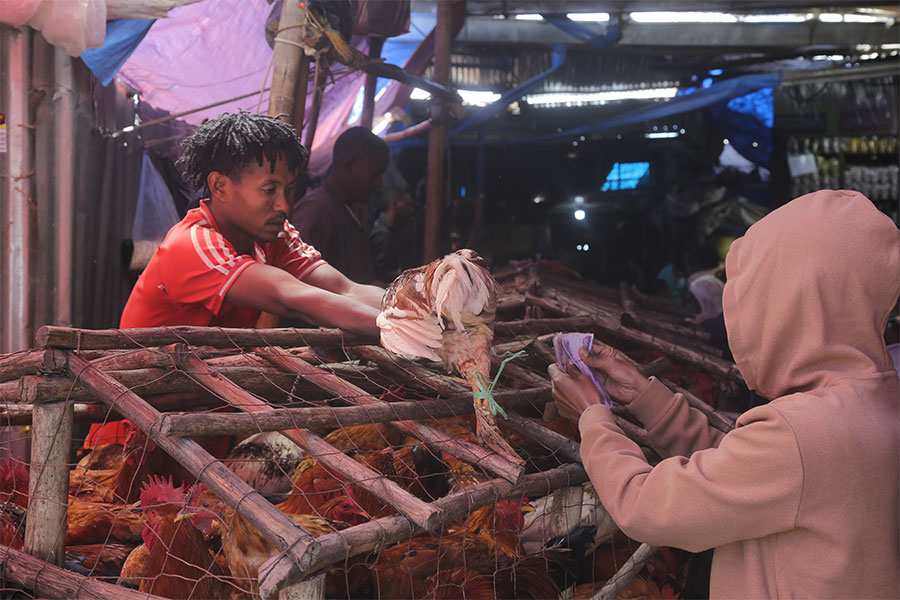
Agenda | Jan 07,2023

Editorial | Jul 20,2024
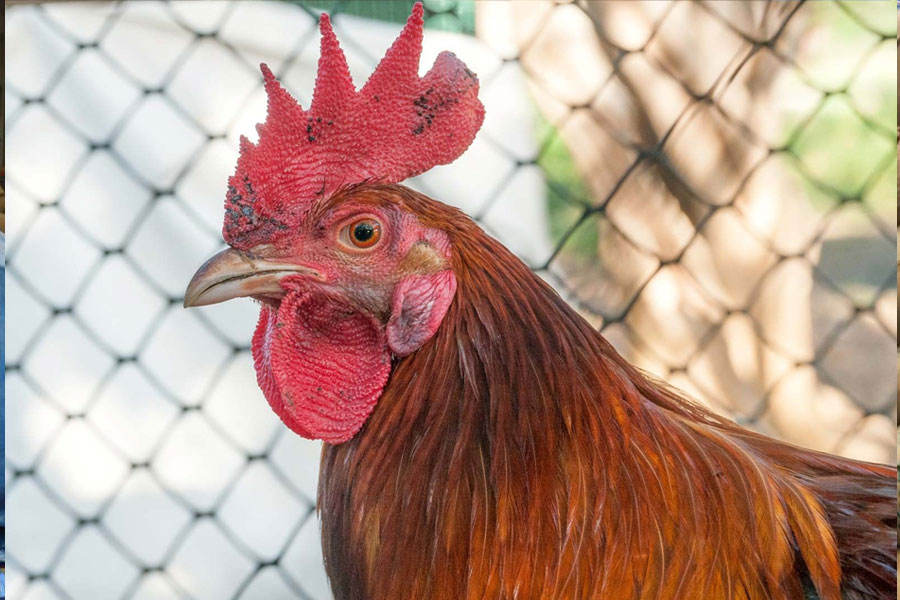
Featured | May 03,2024

Fortune News | Feb 22,2020
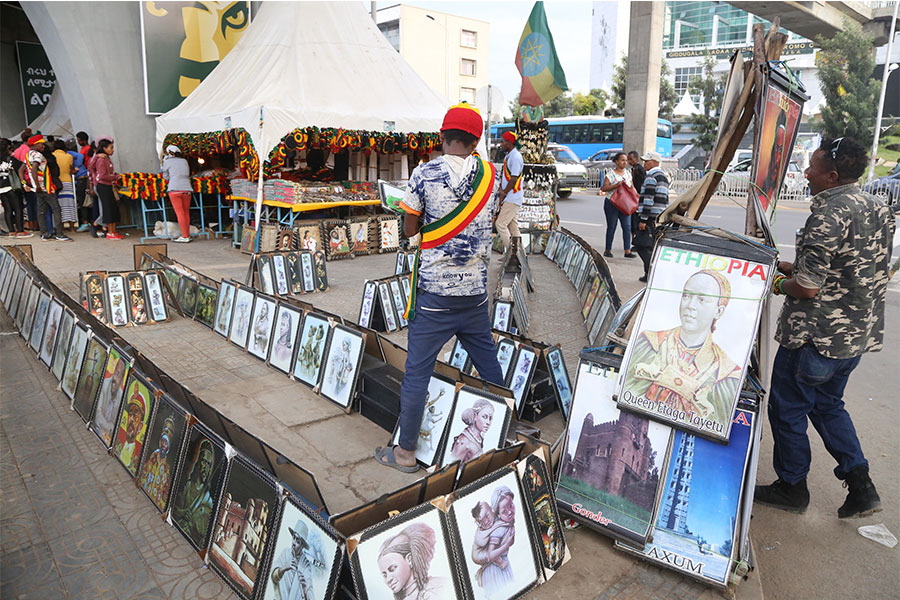
Radar | Apr 26,2019
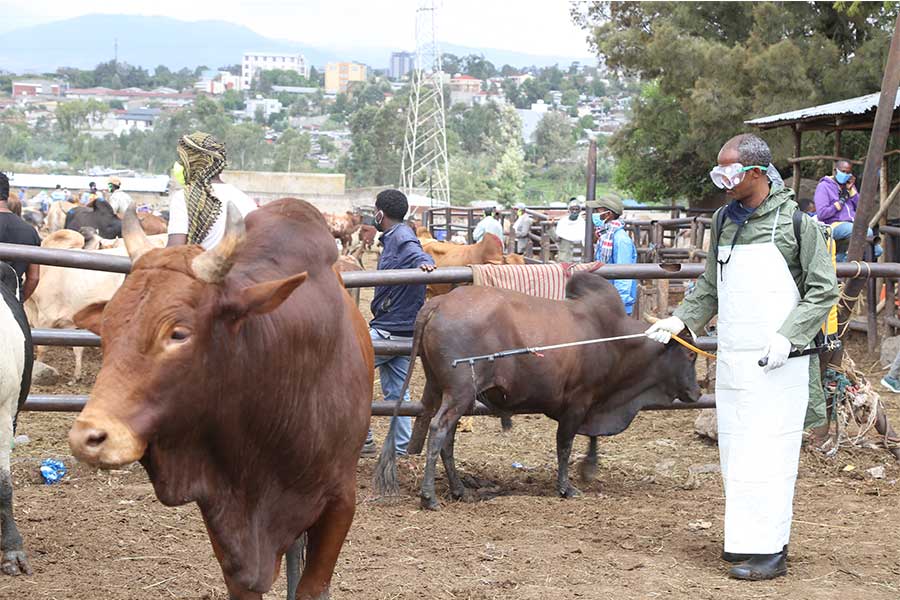
Fortune News | Apr 17,2020
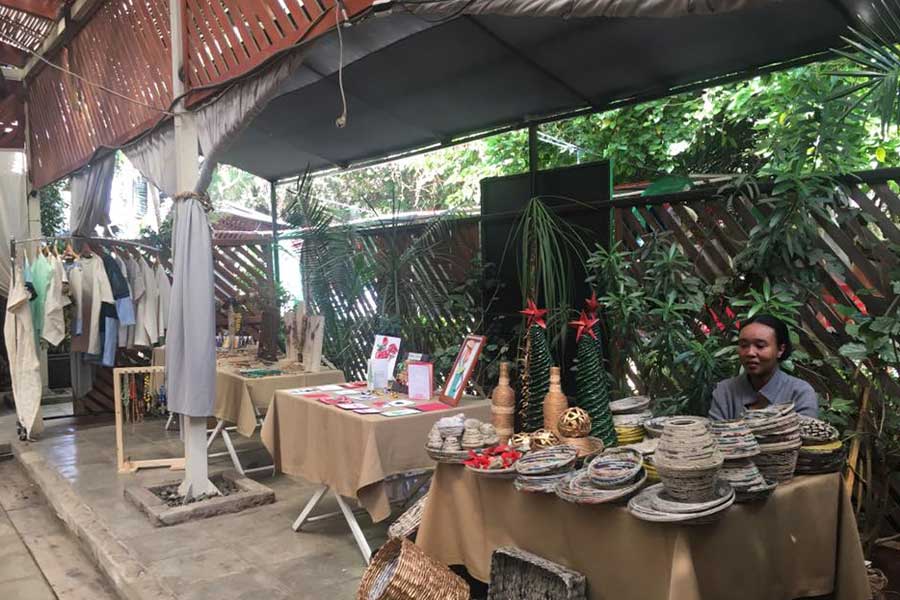
Featured | Jan 05,2020
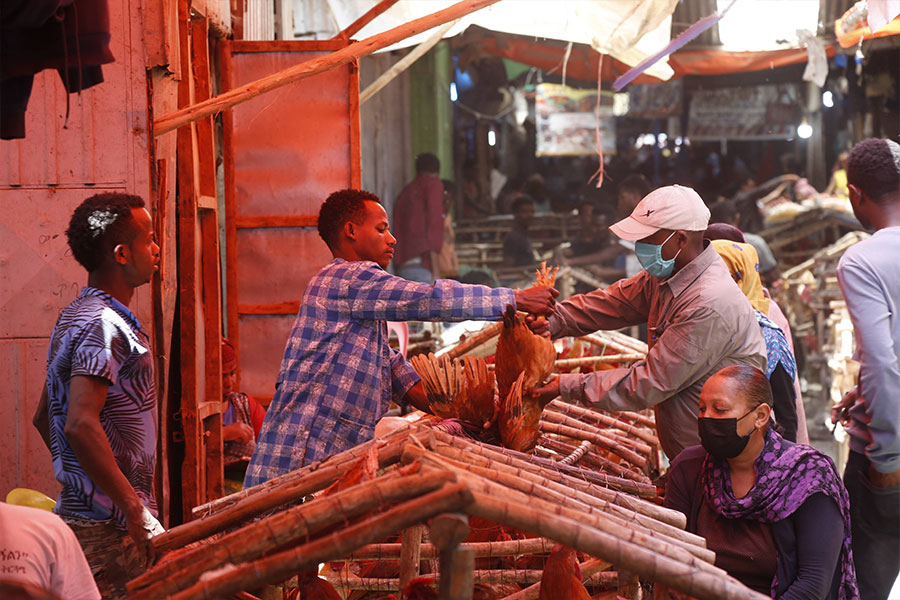
Agenda | Apr 22,2022

Jul 13 , 2024 . By AKSAH ITALO
Investors who rely on tractors, trucks, and field vehicles for commuting, transportin...

Jul 13 , 2024 . By MUNIR SHEMSU
The cracks in Ethiopia's higher education system were laid bare during a synthesis re...

Jul 13 , 2024 . By AKSAH ITALO
Construction authorities have unveiled a price adjustment implementation manual for s...

Jul 13 , 2024
The banking industry is experiencing a transformative period under the oversight of N...

Jul 20 , 2024
In a volatile economic environment, sudden policy reversals leave businesses reeling...

Jul 13 , 2024
Policymakers are walking a tightrope, struggling to generate growth and create millio...

Jul 7 , 2024
The federal budget has crossed a symbolic threshold, approaching the one trillion Bir...

Jun 29 , 2024
In a spirited bid for autonomy, the National Bank of Ethiopia (NBE), under its younge...